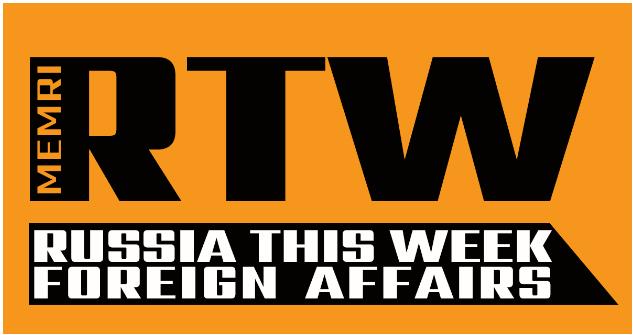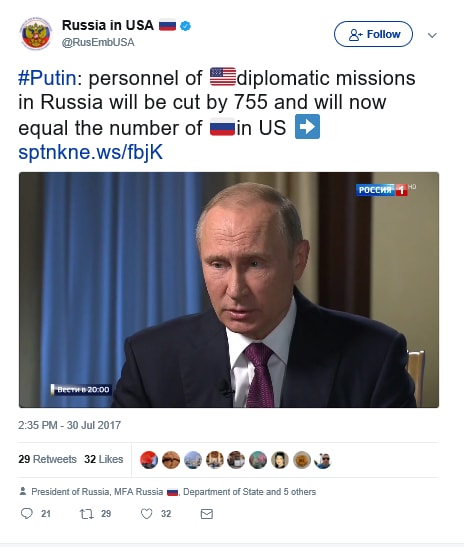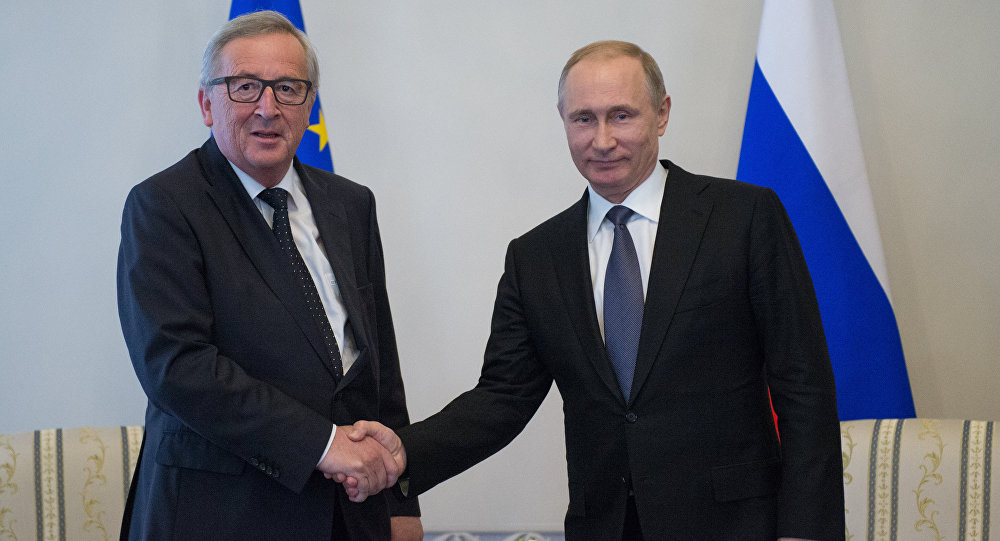Russia This Week is a weekly review by the MEMRI Russian Media Studies Project, covering the latest Russia-related news and analysis from media in Russia, the Caucasus, Central Asia, and Eastern Europe.

Cartoon Of The Week:
In The News
Russia's Reactions To The New Round Of U.S. Sanctions
On July 27, the U.S. Congress passed a bill imposing new sanctions on Russia. The Russian news agency Tass reported that European countries are concerned by the fact that the U.S. bill mentions the Nord Stream-2 project gas pipeline. Tass reported: "The document says that the U.S government should push ahead with its efforts to counter the construction of the Nord Stream-2 pipeline. It asserts that the project has a harmful effect on the European Union’s energy security, the development of the gas market of the Central and Eastern Europe and energy reforms in Ukraine. The bill also states that the U.S. government should prioritize exports of U.S. energy resources to Europe to create jobs in its economy." Russia hopes to exploit differences between the Europeans and the United States.
Meanwhile, the Russian Foreign Ministry stated that Washington will have to reduce the size of its diplomatic staff in Russia to 455 people down from the current staff level of 1,200. In an interview with the Rossiya 1 TV channel, Russian President Vladimir Putin said: "The American side has made a move which, it is important to note, hasn't been provoked by anything, to worsen Russian-U.S. relations. [It includes] unlawful restrictions, attempts to influence other states of the world, including our allies, who are interested in developing and keeping relations with Russia… We've been waiting for quite a long time [in the hope] that maybe something would change for the better, we had hopes that the situation would change. But it looks like, it's not going to change in the near future... I decided that it is time for us to show that we will not leave anything unanswered."
See MEMRI Special Dispatch No. 7032, Russia's Reactions To The New Round Of U.S. Sanctions – Part I,

(Source: Twitter.com/RusEmbUSA, July 30, 2017)
European Commission: The Bill Has Impacts On EU Energy Independence
The European Commission published the following press release:
"On the basis of a presentation by President Juncker and Vice-President Katainen, the College of Commissioners discussed today [July 26, 2017] the state of play of the US draft bill on Russia sanctions ('Russia, Iran, and North Korea Sanctions Act'). Commissioners expressed their concerns notably because of the draft bill's possible impact on EU energy independence. The bill as endorsed by the U.S. House of Representatives demonstrates that a number of these concerns are being taken into account. It nevertheless foresees the imposition of sanctions on any company (including European [ones]) which contributes to the development, maintenance, modernization or repair of energy export pipelines by the Russian Federation. "Depending on its implementation, this could affect infrastructure transporting energy resources to Europe, for instance the maintenance and upgrade of pipelines in Russia that feed the Ukraine gas transit system. It could also have an impact on projects crucial to the EU's diversification objectives such as the Baltic Liquefied Natural Gas project. While the College underlined the importance of the sanctions regime against Russia and its strict implementation, it expressed concerns about the possible negative political consequences of the draft Bill.
"As reiterated at the G7 in May, new sanctions should always be coordinated between allies. President Jean-Claude Juncker said: 'The EU is fully committed to the Russia sanctions regime. However, G7 unity on sanctions and close coordination among allies are at the heart of ensuring the full implementation of the Minsk Agreements. This is a core objective that the EU and the U.S. share. The U.S. Bill could have unintended unilateral effects that impact the EU's energy security interests. This is why the Commission concluded today that if our concerns are not taken into account sufficiently, we stand ready to act appropriately within a matter of days. America first cannot mean that Europe's interests come last'. The EU is currently raising its concerns via all diplomatic channels with the U.S. and its counterparts. The Commission will continue to closely monitor the on-going legislative process in the U.S. and the subsequent implementation of the bill and will act swiftly if and when needed."
(Europa.eu, July 26, 2017)
European Commission President Jean-Claude Juncker said: "The U.S. bill could have unintended unilateral effects that impact the EU's energy security interests… If our concerns are not taken into account sufficiently, we stand ready to act appropriately within a matter of days. 'America First' cannot mean that Europe's interests come last."
(France24.com, July 27, 2017)

Putin with EU's Juncker, Russia believes the EU will side with it against the new round of U.S. sanctions (source: Sputniknews.com)
German Economics Minister Zypries Says That U.S. Anti-Russian Sanctions Is Designed To Stimulate U.S. Energy Exports To Europe
The German media outlet DW.com reported: "German Economics Minister Brigitte Zypries… warned of the impact of new U.S. sanctions against Russia on German companies, particularly those in the energy sector and with business ties with Russia.
"She told public broadcaster ARD that she thought little of sanctions decided on unilaterally, that is without prior consultation with EU partners. Zypries warned against a trade war over this latest round of U.S. sanctions against Russia, saying such a situation would be 'very bad.'
"The minister added she hoped the U.S. administration had not agreed the sanctions with a view to harming Europe. 'But the upshot of it all is that our companies' interests may be harmed,' she argued.
"… The German Committee on East European Economic Relations said U.S. plans for tighter sanctions against Russia had the potential of harming EU firms with energy interests in their giant eastern neighbor. It went as far as to say that the latest U.S. move appeared designed to stimulate U.S. energy exports to Europe.
"The business forum added that the 'possibility of European counter-sanctions against the U.S. should be kept open as a very last option,' if firms in Europe were affected. The committee said it expected German exports to Russia to grow by 20 percent this year, up from an earlier forecast of just 10 percent, despite all the EU and U.S. sanctions in place right now over Russia's perceived role in the Ukraine and Syria conflicts."
(Dw.com, July 27, 2017)
Zypries said: "We see [the U.S. sanctions] as being against international law, plain and simple… The Americans can’t punish German companies because they have business interests in another country… That means that it is right that the European Commission now considers countermeasures. Europe is ready to adopt short-term countermeasures - in other parts of the world too."
(Thelocal.de, July 31, 2017)
France's MFA: Latest U.S. Sanctions Are 'Unlawful Under International Law'
German Foreign Minister Sigmar Gabriel said: "We will under no circumstances accept an extraterritorial application of these U.S. sanctions against European companies. Sanction policy is neither a suitable nor an adequate instrument to advance the interests of national exports and the domestic energy sector."
(Thelocal.de, July 28, 2017)
The French Foreign Ministry took a similar position: "The extraterritorial scope of this text appears to be unlawful under international law. We have challenged similar texts that may have been adopted in the past.
"In order to protect ourselves from the extraterritorial effects of U.S. legislation (and other legislation), we need to adapt our national mechanisms and update European mechanisms… In any event, this issue should be discussed with the institutions, especially the European Commission, and our EU partners."
(Diplomatie.gouv.fr, July 26, 2017)
Lavrov Mocks Pompeo
CIA Director Michael Pompeo said that Russia meddled in the U.S. elections for more than eight years. Commenting on Pompeo' remarks, Russian Foreign Minister Sergey Lavrov said "If it is asserted that we interfered in the U.S. elections in 2008 and 2012, that means that President Barack Obama owed his victories to us. I will refrain from commenting on the issue, as I believe this goes beyond the bounds of reason."
(Tass.com, July 21, 2017)
Speaker Of the Russian Federation Council Matviyenko: Foreign Interference In The 2018 Presidential Elections Will Be Squashed
The Speaker of Russia’s Federation Council Valentina Matviyenko stated that attempts to interfere in the 2018 Russian presidential elections "will be squashed." Matviyenko said: "Such interference [into electoral processes in Russia] took place in the 1990s [to secure Boris Yeltsin's victory against his Communist opponent]. Luckily, those times are gone. But today we see attempts to exert informational influence. Each such attempt will be squashed, measures will be taken."
(Tass.com, July 24, 2017)
Russia-West Arms Race And Military Tensions
According to Vedomosti newspaper, Russian military is actively purchasing "Kalibr" model long-range cruise missiles (which have been extensively field tested in Syria). The publication reported that the military has recently purchased 60 missiles of that type.
According to an unidentified source, close to the Russian Ministry of Defense, the presence of a non-nuclear deterrent capability in the military inventory helps diminish the risks of nuclear escalation. The source claims that the U.S. obtains thousands of cruise missiles and provides them to countries like Poland and Finland (which border on Russia) and thus the Russian military has to react to emerging threats of that category.
On the other hand, Russian defense contractors are behind in deliveries and have supplied to the military only a third of the new armaments scheduled for delivery in 2017, while the annual plan for modernizing older weaponry is only 42% complete .
(Vedomosti.ru, July 27, 2017)
The Russian news agency TASS reported that according to the Minister of Defense Sergey Shoigu, "a total of 16 planes from the U.S. and British tactical air forces have been deployed on a permanent basis in Romania since April. Beginning this year the United States alone conducted over 130 reconnaissance flights along Russia’s southern borders. Moreover, he said, large-scale NATO military drills, involving over 25,000 troops from 22 countries wrapped up several days ago on the western coast of the Black Sea." In response to the military deployment, Shoigu noted: "Under the current conditions, Russia is forced to take symmetric measures on eliminating emerging threats to national security, to take measures of strategic deterrence, and to increase combat capabilities in the Southern Military District… Our active actions to stabilize the situation in the Middle East and support peace in Transcaucasus are viewed by some countries as a threat to their national and allies’ interests. In an effort to block Russia’s participation in the solution to global and regional problems, some countries persevere their attempts to use military force to achieve their geopolitical goals and build up [their] military presence by the Russian borders."
(Tass.com, July 26, 2017)
Russian-Chinese Naval Exercise
From July 25 through July 27, Russia and China participated in a joint naval exercise (Joint Sea-2017) in the Baltic Sea. China contributed three ships to the exercise - the destroyer Hefei, the frigate Yuncheng and the supply vessel Lomahu. The Russian Navy was represented by two corvettes - Steregushchy and Boiky - and the salvage tug SB-123. The exercise also involved Ka-27multi-role deck helicopters, Sukhoi-24tactical frontline bombers, Antonov-26 military transport planes and helicopters based on the Chinese ships.
(Tass.com, July 25, 2017)
It is noteworthy that the Chinese military is participating in Baltic Sea drills for the first time, and the NATO fleet also operates in the Baltic. The Baltic States and particularly countries that were formerly part of the Soviet Union emphasize that the massive Russian drills along their borders cause them stress.
As reported by TASS, Lithuania closely monitored the Russia-China naval drills. Lithuanian Deputy Defense Minister Vytautas Umbrasas stated: "Lithuania closely and constantly observes drills and other military activity conducted in the neighboring region and shares the information it receives with NATO allies."
(Tass.com, July 25, 2017)
Russia's MFA Warns Lithuania
Lithuanian President Dalia Grybauskaitė, after having visited NATO's Tobruq Legacy 2017 drill, said that it's necessary to station American missile defense systems in Baltic States on a constant basis. She added that this would enhance security for all the Baltic States.
The director of the Russian Foreign Ministry's Arms Control and Non-Proliferation Departmentn Mikhail Ul'yanov commented: "This statement testifies that Vilnius persists in its policy of escalating tensions and bolstering weaponry not even of their own but of third countries in close proximity to the Russian borders. It is unclear how this step can reinforce security in the Baltic region, including Lithuania's own security. The effect of such steps, if implemented, would probably be the reverse: in international relations, including a military sphere, every action leads to a counteraction. Apparently the negative state of affairs in Europe following the establishment of missile defense facilities in Poland and Romania is not enough for the Lithuanian leadership and it wants to further exacerbate the situation."
(Ria.ru, July 24, 2017)
Soft power – Radio Sputnik Goes Live in Washington DC

(Source: Sputniknews.com)
Russia's government-funded Sputnik Radio started broadcasting in Washington DC on the FM bandwidth.
Sputnik Radio is available on 105.5 FM, 24 hours a day, 7 days a week.
Mindia Gavasheli, editor-in-chief of the Sputnik Bureau in Washington DC, said: "We’re glad to finally be able to directly address our listeners in Washington. During the last few months Sputnik Radio has become the target of constant attacks in the US corporate media. And often the people who wrote or spoke about us didn’t even bother to listen to our broadcasts first. Now however, Washington residents will get the opportunity to listen to us and not just to what is being said about us, and I believe that the difference will become apparent to them. We hope that our entrance onto the Washington market is just the first step, and will strive to ensure that more and more people are able to hear our broadcasts instead of rumors about them."
(Sputniknews.com, June 30, 2017)









